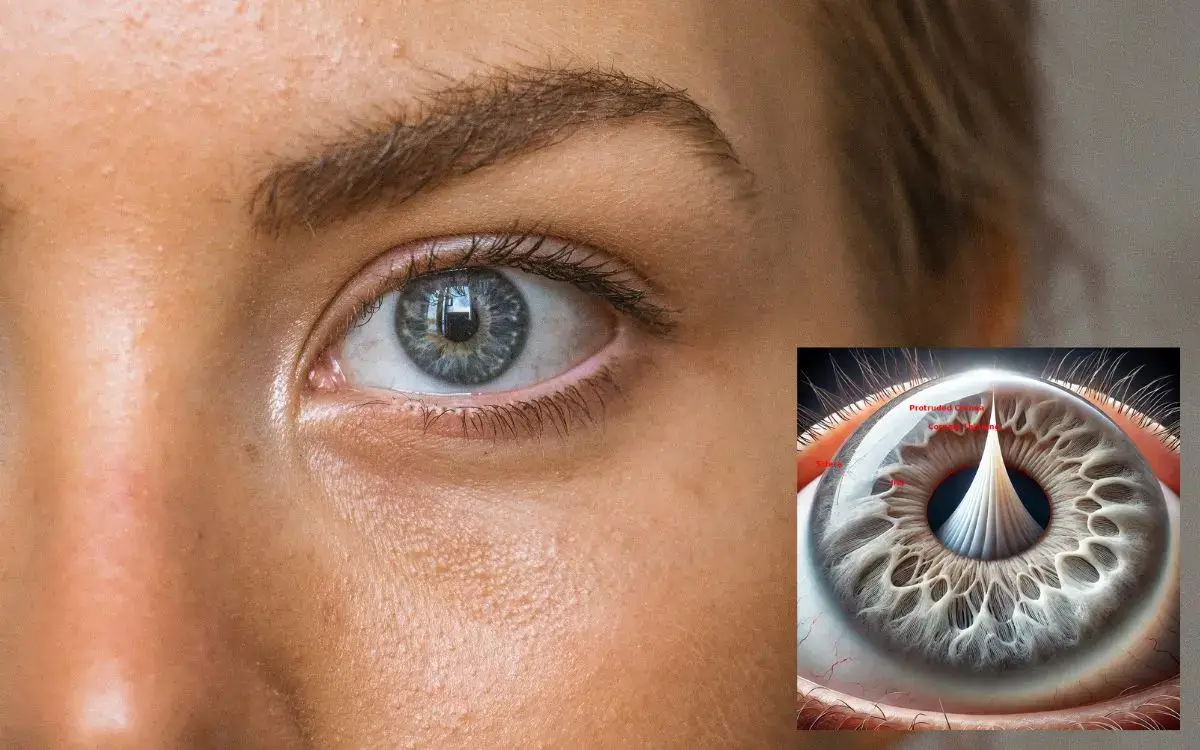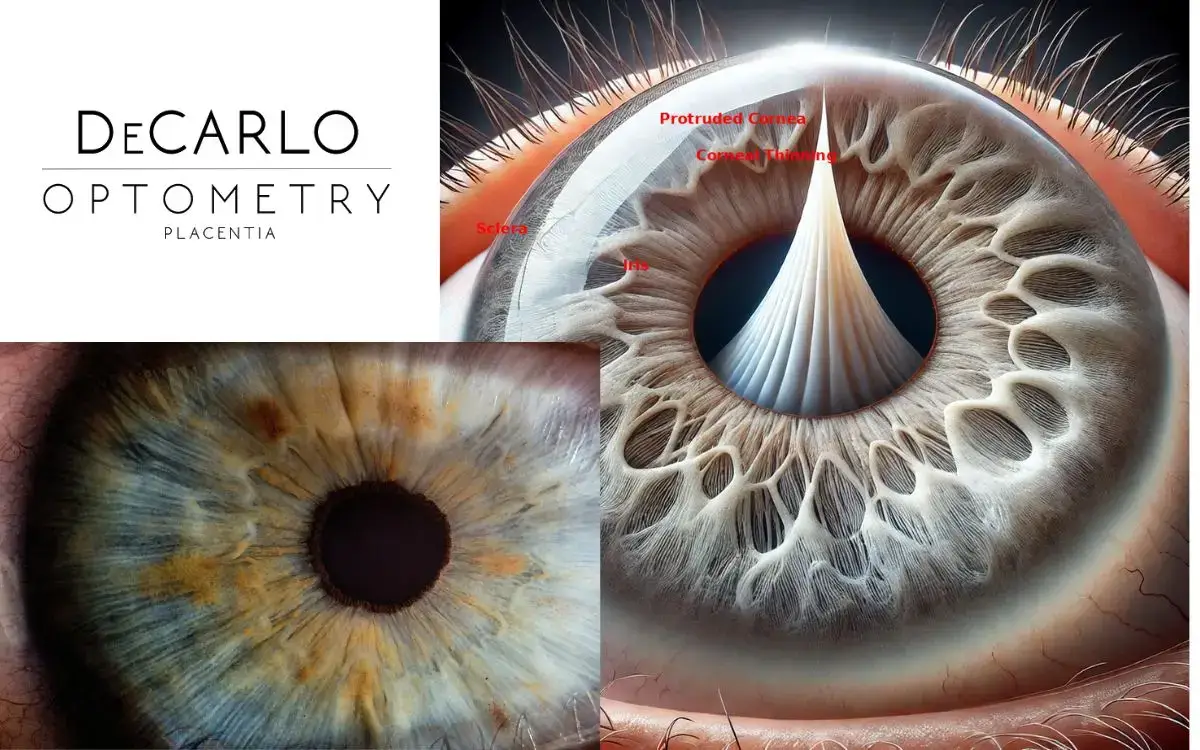
Understanding The Causes And Treatments Of Keratoconus
What You Need To Know About Treatments Of Keratoconus
Keratoconus is a serious condition that can significantly impact your vision and quality of life. At DeCarlo Optometry, we specialize in diagnosing and treating keratoconus with the latest techniques and personalized care plans. Our patients have seen remarkable improvements, and their testimonials reflect the effectiveness of our treatments of keratoconus. If you have questions, our comprehensive FAQs can provide clarity and guidance. Don’t wait to address your eye health – schedule an appointment with us today by calling (714) 996-1136. Take control of your vision and see the difference with DeCarlo Optometry.
Keratoconus Explained
Keratoconus is a condition where the normally round cornea becomes thin and irregularly shaped, resembling a cone. This change disrupts the way light enters the eye and hits the retina, causing distorted vision. People with keratoconus often experience blurred vision, increased sensitivity to light, and frequent changes in their eyeglass prescriptions. The exact cause of keratoconus is not entirely understood, but it is believed to be a combination of genetic and environmental factors.
• What Is Keratoconus?
Keratoconus typically starts during adolescence or early adulthood and can progress for 10-20 years. The severity of the condition can vary, with some people experiencing only mild distortion and others suffering from significant visual impairment. The cornea’s thinning and bulging can lead to severe irregular astigmatism, making it difficult to correct vision with glasses alone. In advanced cases, scarring of the cornea can occur, further impacting vision.treat
• Signs And Symptoms Of Keratoconus
Early signs of keratoconus include slight blurring and distortion of vision, which may be mistaken for myopia or astigmatism. As the condition progresses, symptoms become more pronounced and can include:
- Increased sensitivity to light and glare
- Difficulty seeing at night
- Frequent changes in eyeglass prescriptions
- Double vision or ghosting, particularly when one eye is closed
- Halos around lights
- These symptoms can cause significant discomfort and affect daily activities, such as reading, driving, and recognizing faces.
Keratoconus Cause
Understanding the underlying causes of keratoconus can help in managing the condition effectively. While the exact cause is not fully understood, several factors contribute to its development.
Genetic Factors
Research suggests that genetics play a significant role in keratoconus. It often runs in families, indicating a hereditary component. Studies have identified several genes associated with keratoconus, and having a family member with the condition increases one’s risk of developing it. Genetic predisposition means that some people are more likely to develop keratoconus even without significant environmental triggers.
Environmental Triggers
Environmental factors can also contribute to the progression of keratoconus. Excessive eye rubbing, often associated with allergies or irritants, can weaken the corneal tissue over time. Exposure to ultraviolet rays without proper eye protection can also damage the cornea. Other environmental triggers include chronic eye irritation and poorly managed contact lens use. Addressing these environmental factors can help slow the progression of the disease.
Option Treatments Of Keratoconus
Several treatments of Keratoconus are available to manage keratoconus, ranging from non-invasive methods to surgical interventions. Early detection and appropriate treatment can help maintain vision and prevent further deterioration.
• Corneal Cross-Linking
Corneal cross-linking is a minimally invasive procedure that strengthens the cornea by creating new bonds between collagen fibers. This treatment helps to stabilize the cornea and slow the progression of keratoconus. During the procedure, riboflavin (vitamin B2) drops are applied to the cornea, which is then exposed to ultraviolet light. This process increases the collagen cross-links, making the cornea more rigid. Corneal cross-linking has been shown to be effective in halting the progression of keratoconus in many patients.
• Scleral Lenses
Scleral lenses are large-diameter gas-permeable contact lenses that vault over the entire cornea, providing a smooth optical surface. They can improve vision and comfort for individuals with keratoconus, especially in advanced stages. Unlike traditional contact lenses, scleral lenses do not rest directly on the cornea. Instead, they sit on the sclera (the white part of the eye), creating a fluid-filled reservoir that can correct vision and provide relief from discomfort caused by the irregular shape of the cornea.


Advanced Treatments Of Keratoconus And Costs
Innovative treatments for keratoconus are continually being developed, offering hope for those affected by this condition. Understanding the costs associated with these treatments is essential for planning and decision-making.
CRT Ortho K For Keratoconus
CRT Ortho K (Corneal Refractive Therapy) involves wearing specially designed contact lenses overnight to reshape the cornea. This non-surgical option can temporarily correct vision and is particularly useful for patients with mild to moderate keratoconus. The lenses work by gently reshaping the cornea while you sleep, providing clear vision during the day without the need for glasses or contact lenses. This treatment is ideal for patients who are not ready for surgical options or those who want to avoid invasive procedures.
Ortho K Lens Price: What To Expect
The ortho k lens price varies based on factors such as the complexity of the case and the specific design of the lenses. While it can be a more expensive option compared to traditional lenses, many patients find the benefits worth the investment. Prices can range from a few hundred to a few thousand dollars, depending on the provider and the level of customization required. It’s important to discuss the costs and potential benefits with your eye care professional to determine if ortho k lenses are a suitable option for you.
Progressive Eye Care For Keratoconus Patients
Managing keratoconus requires ongoing care and regular monitoring to ensure optimal vision health. Adopting a comprehensive eye care plan can help manage symptoms and improve quality of life.
• Regular Eye Exams And Monitoring
Routine eye exams are crucial for detecting changes in the cornea and adjusting treatments as needed. Early intervention can prevent severe vision loss and improve outcomes for patients with keratoconus. During these exams, your eye care professional will use specialized tools to measure the shape and thickness of your cornea, track any changes, and determine the best course of action to manage the condition.
• Personalized Care Plans
A tailored care plan that addresses the unique needs of each patient is essential for managing keratoconus effectively. This may include a combination of treatments, regular check-ups, and lifestyle adjustments to maintain eye health and vision clarity. Personalized care plans might also involve coordinating with other healthcare providers, such as allergists or dermatologists, to address underlying issues that could be contributing to the progression of keratoconus.
Keratoconus is a complex condition that requires a multifaceted approach to manage effectively. Understanding the causes, recognizing the symptoms early, and exploring a range of treatment options are key to maintaining good vision and quality of life for those affected by this disorder. Regular eye exams and a personalized care plan are essential components of progressive eye care for keratoconus patients. Whether you are considering corneal cross-linking, scleral lenses, or CRT Ortho K, it is important to work closely with your eye care professional to find the best treatment strategy for your specific needs. By staying informed and proactive, you can take control of your eye health and ensure the best possible outcomes.
Effective management of keratoconus requires expert care and ongoing attention. At DeCarlo Optometry, we are committed to providing the best possible outcomes for our patients. Our personalized treatment plans, informed by the latest research and our extensive experience, ensure that you receive the highest standard of care. Check our FAQs for more information and read testimonials from our satisfied patients. Ready to improve your vision? Schedule an appointment with us now by calling (714) 996-1136. Trust DeCarlo Optometry to help you see clearly and live fully.
